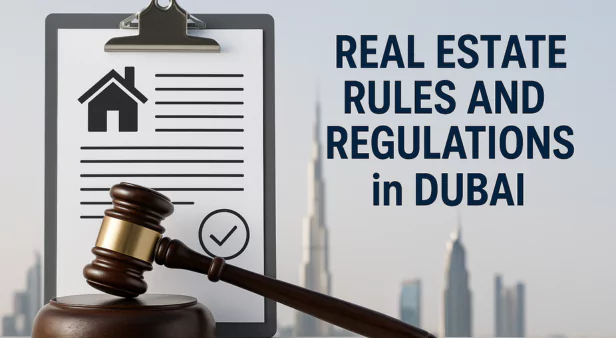Real Estate Rules and Regulations in Dubai
- May 13,2025

Dubai has swiftly positioned itself as a premier destination for real estate investment, drawing interest from global investors due to its dynamic market and investor-friendly policies.
With its iconic skyline, investor-friendly environment, and a booming economy, the city continues to thrive as a destination for property investments. To make informed decisions in Dubai’s property market, it’s crucial to have a clear grasp of the legal systems and regulations that oversee real estate transactions—whether you're buying, selling, or investing.
In this comprehensive guide, we’ll explore the real estate rules and regulations in Dubai, including key laws, authorities, ownership rights, and legal procedures.
Overview of the Dubai Real Estate Market
Dubai’s real estate market is characterized by a high level of transparency, a regulatory framework designed to protect investors, and a variety of property options ranging from affordable housing to ultra-luxury developments. The sector is regulated by several government bodies that ensure fair practices, resolve disputes, and maintain market stability
In recent years, Dubai has made notable efforts to attract global investment by implementing flexible visa options, launching long-term residency programs, and ensuring foreign ownership rights. These steps have added to the maturity and global reputation of the market.
Key Regulatory Authorities
- Dubai Land Department (DLD) : The Dubai Land Department (DLD) plays a central role in managing real estate dealings and keeping official property records across the emirate. It provides services such as property registration, valuation, and the issuance of title deeds. DLD has also introduced innovative platforms like the 'Mollak' system, designed to bring transparency and oversight to service charge management in jointly owned property developments.
- Real Estate Regulatory Agency (RERA) : RERA is the regulatory arm of the DLD. It is responsible for licensing real estate brokers, developers, and property management firms. RERA also monitors projects, ensures compliance with laws, and resolves disputes between stakeholders.
- Dubai Municipality and Dubai Courts : Other entities like Dubai Municipality oversee planning and zoning, while the Dubai Courts handle real estate disputes that escalate beyond RERA.
Types of Property Ownership
- Freehold Ownership : Freehold ownership allows foreigners to buy, sell, lease, and inherit property in designated areas without restrictions. Freehold areas include popular districts such as Dubai Marina, Downtown Dubai, Palm Jumeirah, and Business Bay.
- Leasehold Ownership : In leasehold ownership, buyers can lease a property for a period of 10 to 99 years but do not own the land. After the lease term ends, ownership reverts to the freeholder.
- Usufruct and Musataha Rights : Apart from freehold and leasehold, Dubai also allows for usufruct rights (right to use and benefit from a property without owning it) and musataha rights (granting the right to develop land owned by another).
Laws Governing Real Estate in Dubai
- Law No. 7 of 2006 (Land Registration Law) : This law governs the registration of real estate properties and ensures that ownership is officially recorded in the DLD’s registry.
- Law No. 8 of 2007 (Escrow Account Law) : It requires developers to open an escrow account for each project to ensure that buyers' payments are only used for the construction of that specific project.
- Law No. 13 of 2008 (Interim Property Register) : All sales of off-plan properties are required to be documented in the Interim Property Register, a database managed by the Dubai Land Department to ensure transaction transparency and legal accountability. It helps track sales and ensures transparency.
- Law No. 9 of 2009 (Strata Law) : Regulates jointly owned properties such as buildings with multiple units and ensures proper management and maintenance of common areas.
- Tenancy Law (Law No. 26 of 2007 and Law No. 33 of 2008) : These laws regulate the relationship between landlords and tenants, including rental increases, eviction terms, and dispute resolution.
- Law No. 6 of 2019 (Jointly Owned Properties Law) : This law restructured the way buildings and communities are managed. It mandates the use of management companies and the Mollak system for transparency in service charge collection.
Real Estate Broker Regulations
To operate legally in Dubai’s real estate market, brokers are required to obtain a license from the Real Estate Regulatory Agency (RERA). This involves undergoing professional training and successfully passing a qualifying examination.
The certification process ensures that brokers have a solid understanding of property laws, ethical practices, and market procedures—promoting trust and professionalism in the industry. RERA’s code of ethics mandates transparency, fairness, and accountability from all real estate professionals.
There are strict penalties for unlicensed brokerage activity, which includes heavy fines and potential blacklisting.
Developer Regulations and Off-Plan Sales
Developers are required to be registered with RERA and must adhere to stringent regulations when selling off-plan properties. These include:
- Maintaining escrow accounts
- Securing permits before launching projects
- Submitting project updates to RERA
- Providing buyers with clear timelines and specifications
Off-plan buyers should verify the project's registration on the DLD website to ensure it is legitimate and approved.
Developers must also complete a certain percentage of construction before they can start collecting large payments from buyers.
Rental Regulations
Dubai’s rental laws are designed to protect both landlords and tenants. The rental increase calculator, available on the DLD website, determines permissible rent hikes based on current market conditions. Tenants can file complaints with the Rental Dispute Settlement Centre (RDSC) in case of disagreements.
Eviction notices must be served at least 12 months in advance, and valid reasons must be provided under the law, such as property sale or owner's personal use.
Real Estate Investment Trusts (REITs) and Funds
REITs in Dubai allow investors to invest in income-generating real estate without owning the property directly. They are regulated by the Dubai Financial Services Authority (DFSA) and offer a more accessible entry point into the property market.
REITs contribute to market liquidity and provide a lower-risk alternative for those not looking to manage properties directly.
Inheritance and Property Succession
Dubai follows Shariah law for inheritance unless the deceased has a registered will at the DIFC Wills and Probate Registry. Non-Muslim expatriates are encouraged to prepare wills to ensure their assets are distributed according to their wishes.
A DIFC will can cover real estate and personal assets in Dubai and the UAE, offering peace of mind for foreign investors.
Property Taxes and Fees
Dubai does not levy property taxes, making it an attractive destination for investors. However, certain fees apply:
- Registration fee: 4% of the property value
- Agency fee: Typically 2% of the property value
- Developer fee: Varies based on the developer
- Maintenance fee: Charged annually per square foot
- Mortgage registration fee: 0.25% of the loan amount
These fees must be factored into the total investment cost.
Real Estate Dispute Resolution
Disputes can be resolved through the Rental Dispute Settlement Centre, RERA, or the Dubai Courts. The process is designed to be fair, efficient, and transparent. Mediation is often encouraged before escalating to legal action.
The DLD also has a legal affairs department that provides advisory services to property stakeholders.
Recent Updates and Initiatives
- Golden Visa for Property Investors : Investors who buy property worth AED 2 million or more are eligible for a 10-year Golden Visa, offering long-term residency and added security. This initiative aims to encourage long-term investment and population stability.
- Digital Transformation : DLD has launched several smart initiatives such as blockchain-based title deed registration, online property transfers, and the "Dubai REST" app, making property management and transactions more efficient.Online property valuation tools, virtual property tours, and paperless transactions are all part of Dubai's push toward a smart real estate ecosystem.
Regulations on Holiday Homes
Owners can now legally rent out their units as holiday homes through licensed platforms, offering an alternative revenue stream and improving tourism-related real estate.
The Dubai Tourism and Commerce Marketing (DTCM) department regulates short-term rentals and ensures compliance with hospitality standards.
Tips for Buyers and Investors
- Verify developer and project registration with DLD
- Consult licensed brokers for guidance
- Understand your rights as a tenant or buyer
- Review all contracts carefully before signing
- Use official channels for payments and registration
- Check escrow account status before paying for off-plan units
- Read homeowners association (HOA) rules in strata communities
Conclusion
Dubai’s real estate market continues to evolve with robust regulations, investor-friendly policies, and transparent procedures. Understanding the rules and legal framework is
crucial for making informed decisions and protecting your investment. Whether you're a first-time buyer, seasoned investor, or tenant, staying updated on the latest real estate regulations ensures a secure and rewarding experience in one of the world’s most dynamic property markets.
By educating yourself on these laws and using the services of licensed professionals, you’ll be better positioned to navigate Dubai’s exciting real estate landscape with confidence and clarity.







